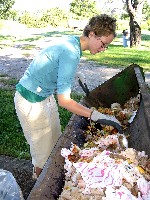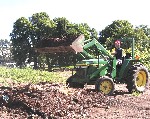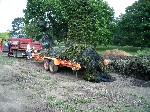Posted on Friday, September 7, 2007
Summer does not end on September 21 at the Field Station. It ends around Labor Day, give or take a few days! Then a fresh start begins.
We employ two students full-time in summer as workers and caretakers. This year we hired the same students who worked a year ago. They are veterans and know the "ropes." They easily manage the routine tasks. That's good. Their summer work ended in late August. The 2007 projects included the usual mowing and trimming but ended with the making of a collection of plants for the herbarium, a plant museum. Representative plant parts are properly mounted on 11½ x 16½ sheets, identified and labeled as historic records of what was growing this season in the three Successional Plots dating 1981, 1993 and 2005. Every 12 years we disturb (strip of all vegetation, plow and level) a fresh one-acre plot, then let it alone to go through its own cycle of change. This is called succession. Change is already evident in comparing the plots. Eventually one will be able to "walk through time" from grass and shrubs into a forest of trees. Documenting the plants as change takes place is important in such a long-term study.
Our late summer work also included upgrading a stretch of the Frey Nature Trail that connects the Nature Center and east parts of the Field Station with Brittain Lake and the main campus. This trail leads through a wetland and consists of a boardwalk with stretches of grass. In most seasons some stretches of grass can be flooded and become hindrances to a comfortable walk. Two years ago 20 truckloads of dirt excavated from the site for construction of Berlin Village were brought out here; finally, this August (with the very dry conditions), the dirt was moved by tractor front-loader onto the muddy spots of the trail that have now been built up eight to ten inches. After the newly seeded grass takes over, we should have an all-weather trail. People from the college and community regularly check out the upgraded trail. Their comments range from "very nice" to "it was about time."
The span just before and after Labor Day is busy and special. Students return to Westminster's campus. Old friends stop in to say hello. New friends are made along the way. There are special challenges and many nice parts to this fresh start at the Field Station. I'll mention a few.
A Westminster alumna and her husband came to visit after depositing their daughter at another college. They had made a financial contribution to the on-going work here and, for many other reasons, deserved special attention! When I asked what they would like to see that has changed from years ago, the answer was "everything." I demonstrated composting, walked the trail with them, talked about how the Field Station is used by classes, scouts, young children and community groups. Later we had a meal together in our home and continued our chat. All nice!
Volunteers are always welcome. Last week my visiting granddaughter (recently from a Peace Corps assignment in Africa) and a local dentist actually volunteered to hand sort food waste from the dining hall. This amounted to putting on gloves, groveling through "stuff" that some people would find offensive and removing non-compostables, mostly plastics. The same day a gentleman from south of Youngstown stopped by to see how our tractor-mounted compost stirrer worked to mix the rows of compostables. He is considering getting that system for his horse farm. Another day I spent consulting in Mahoning County, Ohio on the possible set-up of a composting operation and several days later a woman from Volant came by to ask about composting fall leaves in that village. The message is clear: composting is catching on and needs to become a way of life for the majority if we are to make progress in conserving our precious resources.
I had a delightful time this week talking with college students. Two of them were looking for a useful, semester-long environmental science project. Another student wanted to know how volunteers from a campus club could be involved out here. Students want to do something useful and that is always encouraging. We went through possibilities that ranged from hand sorting compostable food wastes to chemical testing of the finished product. And we even discussed how students could be involved in recycling corrugated cardboard and athletic shoes. The Reuse-A-Shoe program of the local Kiwanis Club rescues athletic shoes from landfills and has, since February 2005, recycled over 8,000 shoes here at the Field Station. This is a joint community-college venture. We collect old athletic shoes in bins on the campus, community schools and churches and other local places. We ship these to Oregon where Nike shreds them and recycles the separate materials into athletic surfaces for gyms and playgrounds.
This week, pondweed is being "harvested" (cut and removed, rather than treated with herbicides) from Brittain Lake. The pondweed is brought here for composting where it will be mixed with leaves, wood chips, shredded paper and food waste to produce, in only four months, a valuable product for nurturing trees and grass.
The onset of the semester at Westminster has, as usual, brought people and classes out to the Field Station. Two artists sat in the yard and sketched nature; students in introductory biology and ecology classes came to measure trees and begin ecology projects; a small group had a campout by our fire pit; and an alumnus came by to drop off compostables and visit. It doesn't get much better than this!
Clarence Harms, Director
Field Station


